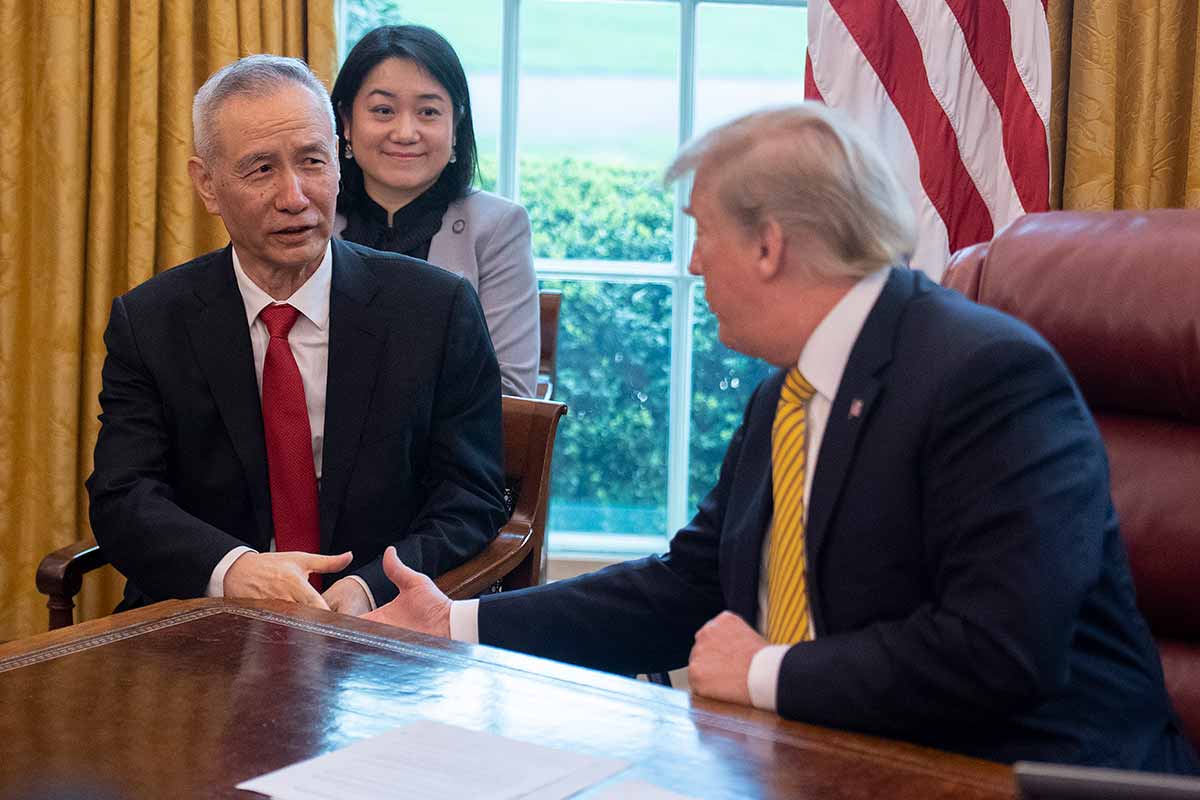President Donald Trump declared China’s leaders “broke the deal” he was negotiating with them on trade, ratcheting up his rhetoric ahead of fresh negotiations that were already clouded by imminent tariff increases and China’s threats of retaliation.
“They broke the deal!” Trump said at a campaign rally Wednesday night in Panama City Beach, Florida, leading him to raise tariffs. The president noted that top Chinese trade negotiator Liu He was traveling to Washington for further talks. “Good man,” Trump said, “but they broke the deal.”
The United States (US) has said it would raise tariffs on US$200 billion of Chinese goods to 25 percent from 10 percent on Friday after alleging China reneged on provisions of a draft trade deal the White House considered settled. The Chinese government has said it will retaliate, escalating the trade war between the two countries.
Trump said there’s “nothing wrong with taking in US$100 billion a year” in tariffs on Chinese imports, in the absence of a trade deal.
“They come in tomorrow and whatever happens, don’t worry about it. It will work out. It always does,” he said. Although Trump often claims China is paying the tariffs, most economists say American companies and consumers are bearing most if not all of the cost.
Shares retreat
Japanese stocks and Korean shares retreated with US equity futures Thursday. Australia’s benchmark was little changed. Treasuries rallied while China’s yuan was little changed.
Trump has a long history of attacking China at campaign rallies, although he has adopted a more diplomatic approach and even courted Xi Jinping and senior Chinese officials in official meetings. He has also threatened to label China a currency manipulator, but still hasn’t done so.
A Chinese delegation headed by Liu, a Communist Party Politburo member and vice premier, was scheduled to arrive Thursday in Washington for two days of talks with US officials.
Both sides were trying to shape perceptions ahead of what could be a pivotal round of the negotiations. On Wednesday, Trump said the Chinese indicated they wanted to “make a deal” in Washington. Hours later, China’s Ministry of Commerce warned it would strike back with “necessary countermeasures” if the US raises tariffs.
Escalation threat
The escalation threat has roiled financial markets, reviving concerns that a trade war could undermine a pickup in the global economy in the second half of the year. The International Monetary Fund (IMF) cut its 2019 global outlook last month to the slowest pace since the financial crisis, citing trade tensions as a risk to growth.
Despite the tough rhetoric, it’s likely the two nations will eventually cut a deal, said Welles Orr, a senior trade adviser at law firm Miller & Chevalier who served as a senior trade official under George H. W. Bush.
Intense negotiations
Officials have been locked in intense negotiations for about five months, making progress on issues ranging from Chinese purchases of American goods to enforcement of any agreement. They still face significant gaps including over whether to remove tariffs.
“Both sides are so hungry to get this thing done,” Orr said in an interview. “The incentive is strong for the US, because they’ve made such good headway. On the other hand, the Chinese want to show they can be serious negotiators and deliver on their commitments.”
There’s an 80 percent chance the US and China will eventually reach a deal, JPMorgan Chase & Co. Chief Executive Officer Jamie Dimon said Wednesday. “Now we have this whole kind of little bump in the road,” Dimon said in an interview. “Sometimes his tweets don’t pan out to be as bad. I don’t think they’ll get the deal done by Friday.”
Goldman Sachs economists echoed that view. While the sides will probably eventually agree to a deal, there’s only a 10 percent probability of an agreement by Friday, the firm said in a research note authored by economist Alec Phillips. Goldman puts the likelihood of the US following through on its tariff threat on Friday at 60 percent.
“It’s difficult to make a high-confidence call. We think it’s likely the latest developments reflect an unusually messy and public final stage to negotiations. We can’t rule out the possibility something more serious has gone awry”, explained Tom Orlik, chief economist at Bloomberg.
The Trump administration this week accused Beijing of backpedalling on commitments it made during the negotiations. In the past week, Chinese officials told their US counterparts they wouldn’t agree to a deal that required revisions of Chinese law, as they had previously promised to do, according to people familiar with the matter.
Some analysts believe a collapse in talks could trigger a major selloff in risk assets. The imposition of new tariffs and a “complete breakdown” in negotiations would probably cause a drop of 10 percent to 15 percent in US stocks from their highs, and a 15 percent to 20 percent plunge in Chinese equities, UBS Global Wealth Management Chief Investment Officer Mark Haefele said in a note this week.
“It remains our base case that the US and China will ultimately reach a deal, but with the deadline for the imposition of new tariffs now very short, the path to that deal could well be bumpier than it once looked,” said Haefele. - Bloomberg
